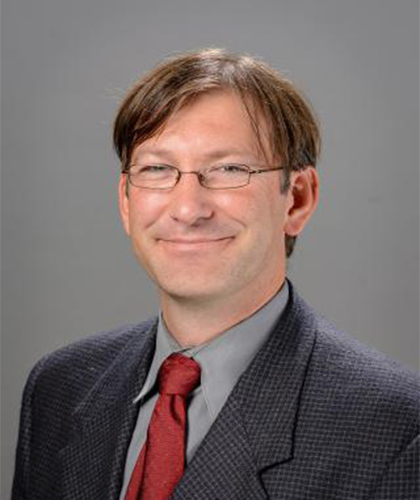
Goupell, Matthew
Director
Co-Director
College of Behavioral and Social Sciences
Brain and Behavior Institute
Cochlear implants are the most successful neural sensory prosthesis, partially restoring the sensation of sound and understanding of speech to severe-to-profoundly hearing-impaired individuals. However, cochlear implants do not "cure" deafness and they do work equally for everyone. Cochlear implants provide a novel way of understanding central neural processing of sound as they bypass peripheral encoding.
My current research focuses on how people with cochlear implants (CIs) process sounds and understand speech. Specifically, I am interested in:
Sound localization and binaural speech unmasking with adult bilateral CI users. How aging affects temporal processing and speech understanding in older CI users. How language and cognition affects understanding speech with a CI.
The research involves speech understanding and sound localization for unilateral and bilateral cochlear-implant (CI) users, namely, we systematically examine factors that may cause a difference in acoustic perception between CI and normal-hearing listeners. The research aims to understand the advantages, capabilities, and limitations of bilateral CIs under controlled multi-electrode stimulation. Controlled multi-electrode stimulation research has only started recently. Research on this topic is a logical next step in bilateral CI research; it helps provide understanding of an important advantage of bilateral implantation, that of understanding speech in noisy environments.
Current CI systems introduce fundamental differences from the healthy auditory system, and these differences alter important acoustic information enough to significantly diminish any binaural hearing advantage. Some of these limitations may be compensated by different processing schemes, while others are intrinsic to electrical stimulation and cannot be compensated with the current generation of CIs.The ultimate aim is to provide a binaural advantage to bilateral CI users’ speech understanding. These studies will guide the design of future cochlear implants.
The goal of my other research study is to compare central temporal processing in younger and older normal-hearing and cochlear-implant listeners using both basic and complex (i.e., speech) stimuli, and how this relates to cognitive processing
BACKGROUND
Dr. Goupell is the director of the Auditory Perception and Modeling Lab, located at the University of Maryland in College Park. He grew up in Mt. Pleasant, MI. He attended Hope College, majoring in physics and mathematics. He studied with Bill Hartmann, and graduated from Michigan State University in 2005 with his PhD in physics. His dissertation was on modeling how the binaural system detects small differences between the ears. He spent three years in Vienna, Austria working for the Academy of Sciences in the lab of Bernhard Laback, where he researched sound localization in bilateral cochlear-implant users. He then moved to Madison, WI to the Binaural Hearing and Speech Lab of Ruth Litovsky for two years. He began his work investigating binaural masking level differences and decorrelation detection with cochlear-implant users. In the fall of 2011, he started as an assistant professor in the Department of Hearing and Speech Sciences at UMD. He continues to focus his research on cochlear implants, sound localization, understanding speech in noise, and neural modeling. He teaches hearing science, psychoacoustics, and cochlear implants.
- Cochlear Implants
- Binaural Hearing
- Neural/Computational Models
- Speech Understanding